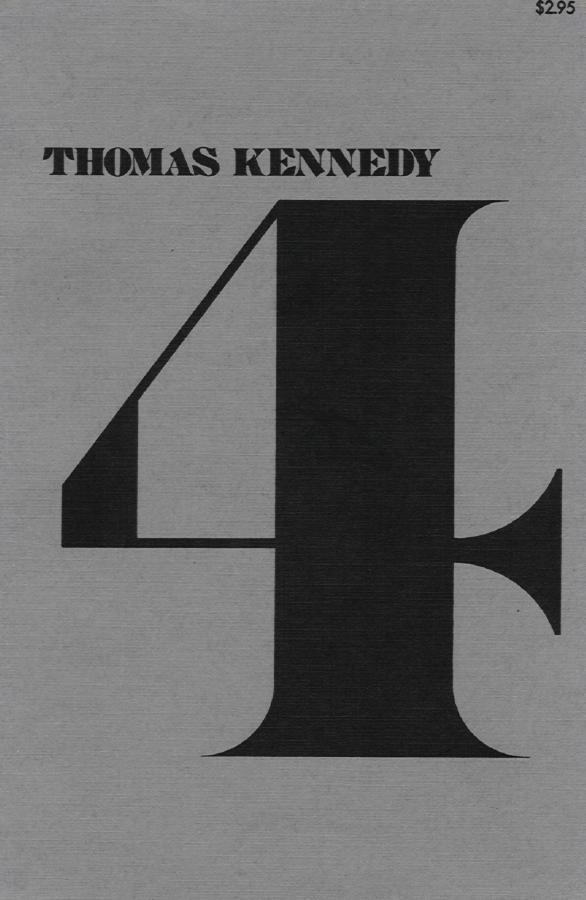 ____
____ ____
____
My Kansas author for the month of December, 2001,
is Thomas C. Kennedy, whose collection of one-act
plays,
Four,
was published by The
Woodley Press in 1982.
Tom is a good friend and, since he became a member of the Washburn English Department in 1972, a colleague of many years. At one time I thought I was making a career of appearing in Kennedy plays as an actor, for I was in staged presentations of all four of the one-act plays in Four, "The Three Wise Men" as a reading at more than one Christmas party, "Nixon Meets Manson" in a reading at a Chamber Theatre meeting in 1979, and actual performances (learned the lines) of the other two, "The York Crucifixion" staged at Central Congregational Church, in Topeka, in 1974, and "Dr. Mudd," where I played Dr. Samuel Mudd to Tom's Ghost of John Wilkes Booth in a television production on Washburn's KTWU in 1978, which was then aired several times (and I have on tape). So I have fond memories of those plays.
 ____
____ ____
____
FOUR TOM KENNEDY BEOWULF
Comments on Four on the Woodley Press web site (see this site for ordering information):
These plays, set in various historical periods, offer a satirical comment on modern life. Although independent of one another, they are bound together by the themes of politics, violence, and religion. Characters ranging from George Washington to Charles Manson to Jesus Christ make them interesting both to read and to perform.
"Kennedy's plays are brief moments in life. They are rather like a theatrical version of the short story. At that length, they work because they capture the moment and bother you afterwards. Most importantly, they can make you laugh and make you sick and fight . . . [the true enemy] ignorance, arrogance and emotionalism."--The Washburn Review
Tom grew up in Philadelphia and Boston, went to college at Swarthmore, and got an M.A. and Ph.D. in Medieval English literature at Columbia, his dissertation "Anglo-Norman Poems About Love, Women, and Sex from British Museum MS Harley 2253" in 1973. All that was a long time ago, but Tom has continued as a specialist in Early English Literature and has just recently published his translation of Beowulf with another Kansas publisher, Leathers Publishing, 4500 College Blvd., Leawood, KS 66211 (888) 888-7696.
Two years ago Tom also published Poems and July 1959, a collection of original poems including free verse, blank verse, sonnets, concrete poetry, a villanelle, haiku, and translations from Lao Tzu, Ovid, Dante, San Juan de la Cruz, Rilke, Heine, Mallarmé, and anonymous Anglo-Saxon bards--and a short auto-biographical account of the poet as a teenage want-to-be beatnik on the road. This is available from the author ($20 hardback) at: English Department, Washburn University, Topeka, KS 66621, or zztken@washburn.edu. I'll offer, as a sample poem from that collection, the opening 50 lines from Tom's translation of Beowulf, which he includes, to give you a taste of that, too (I leave it to you to find the revisions):
Beowulf (vv 1-52)
Yeah, we've heard tell about old times,
fame of the Spear Danes, power of tribe kings,
and how those princes framed their strength.
Oft Skyld Skefson knocked the mead bench
out from under the scather gangs,
frightened the earls since he was found
a naked babe. Biding his time,
waxed straight and strong under welkin
until all those around sitting
over whale path should hear his word
and tribute yield. That was a good king.
His son was born young in the yard
that God had sent to comfort folk.
God saw they princeless long endured.
Wielder of fame to child of Skyld
world honor gave. His blade sprang wide
across the land. A good prince shall
dispense his goods, gifts of plenty,
that in his father's home shall dwell
his loyal comrades, and when war comes
fight for the folk. In all nations
a man shall thrive by deeds of love.
Skyld departed as time was shaped,
man of action fared to the Lord.
They bore him then, journey comrades,
down to the brim as he them bade
when his words ruled, friend of Scyldings,
king of the land who owned it long.
There at the dock, the ring-prow stood,
a king's vessel, icy, eager.
Then they laid down their well-loved prince,
their ring-giver in ship's bosom,
mighty by mast. Of fairer keel
with war weeds geared, armor and swords,
I've never heard. On his chest lay
much ornament that should with him
as ocean's property go far.
No less in gifts, in king-treasure,
they gave than those who sent him forth
for the first time over the waves
a child alone. A sign they set
high over head. They let ocean
bare him away, gave him to sea.
The mind was sad, mood in mourning,
and yet no man, hall-sage, hero,
under heaven, can say for sooth
by whom that cargo was received.